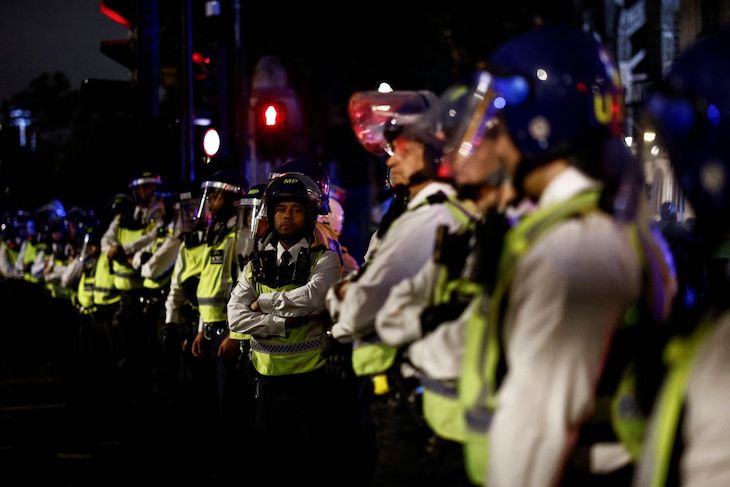Does Britain have a ‘two-tier’ attitude towards policing? The Home Affairs Committee, made up of 11 Tory, Lib Dem and Labour MPs, is dismissive of the suggestion. ‘It was disgraceful to see the police officers who bore the brunt of (the) violence being undermined by baseless claims of ‘two-tier policing’, its report, published earlier this month, says of the police response to the ugly scenes that followed the Southport murders last July. It’s a questionable claim – and I’ve been left wondering why they chose to reference a piece I wrote about two-tier policing for The Spectator in August.
Legislation in the pipeline could give the police even more powers
‘Police response to the 2024 summer disorder’, the 46-page report put out by the committee, reads like an apologia. Drawing on evidence given by the police and bodies representing them, the committee supports senior officers in their condemnation of accusations of ‘two-tier policing’:
‘During the disorder, the police began to face accusations of ‘two-tier policing,’ suggesting that those involved in disorder had been policed more strongly than previous protesters. Parallels with Black Lives Matters protests, and the accusation of two-tier policing, were subsequently echoed by mainstream commentators, for example in the Daily Telegraph and The Spectator’.
It isn’t clear why MPs referenced my article, but what does seem plain to see is that the Home Office – and the parliamentary committee charged with scrutinising its areas of responsibility – appear to be closing ranks. At a time when people are increasingly concerned about online censorship, the report even recommends giving the police ‘enhanced capacity to monitor and respond to social media’.
The committee is surely missing the point and ignoring a bigger, more pressing issue: how and why the police are rapidly losing the trust of the public.
How shall I count the ways? Space is limited and I am sure readers have plenty of their own examples of police overreach. My personal highlights include the doorstepping of Helen Jones for comments on WhatsApp. In calling for the resignation of a local councillor, Jones was not only within her rights as an innocent citizen, but arguably acting as an exemplary one, holding her elected representatives to account. Over the past year, the media has been full of other examples of the police harassing people for things said online or on messaging apps. A mum and dad in Hertfordshire were even hauled in by cops after their child’s primary school took objection to emails and WhatsApp messages they had sent.
Last August, journalist Richard Medhurst was arrested at Heathrow under anti-terrorist legislation and held in a cell for 15 hours. You can hear the sense of betrayal in his response: ‘My family goes back 1,000 years in this country. I come from a long line of public servants, my father served in the London police before entering the United Nations.’
Then there’s the forced entry of a Quakers’ meeting house in central London to arrest and handcuff six women attending a meeting. The police were acting under the Police, Crime, Sentencing and Courts Act of 2022 which created a new crime of ‘conspiring to create public nuisance’. This, as Sam Leith puts it, is ‘dismayingly close to Philip K. Dick’s idea of pre-crime’. It certainly imperils the right to assembly.
Legislation in the pipeline could give the police even more powers. The Crime and Policing Bill will grant them the right to search a property without a warrant. It paves the way for the police to gain access to millions of driving records, sparking fears they could be used for mass surveillance. It’s far from groundless: in the wake of last summer’s unrest, Starmer called for the use of facial recognition to be expanded. Police forces have been using mobile facial recognition cameras in London and Cardiff for some time. Now the Metropolitan Police has announced the UK’s first permanent facial recognition cameras on the streets of Croydon, in southeast London.
There’s been no proper parliamentary debate about the introduction of mass surveillance. I’m one of many who feel it violates basic democratic principles such as the right to privacy, the ability to go about my business without undue interference and the right to be treated as innocent until proven guilty.
This brings me to an important point about the legitimacy of policing in the UK. When it comes to attitudes to the police, the distinction between what is legal and not is not necessarily material for the average person. If people feel the police are treating them unfairly or generally not working in the public interest, they start to withdraw their consent. Many will be unaware of changes in the law; they will, however, be highly attuned to heavy-handed policing and how that makes them feel.
British policing, famously, is defined by its emphasis on consent. The definition commits the police to maintaining “at all times a relationship with the public that gives reality to the historic tradition that the police are the public and that the public are the police”. I grew up at the tail end of Dixon of Dock Green. Although memories of both the television programme and actual bobbies on the beat are hazy, that sense of the police being on my side lasted until recently. When a policewoman knocked on my door to ask me about a burglary opposite and whether I’d consider starting a neighbourhood watch, I got the vicar to lend me the church hall, leafleted the neighbours and chaired the inaugural meeting.
These days, with the more likely prospect of finding an officer on the doorstep to investigate ‘something I’ve said’, I feel a lot less cooperative.
If a nice girl who grew up on Dixon of Dock Green is as disenchanted with British policing as I am, some reflection is due. Parliamentarians may be disinclined to scrutinise an increasingly adversarial police force but we – the electorate and taxpayers – are watching closely.







Comments